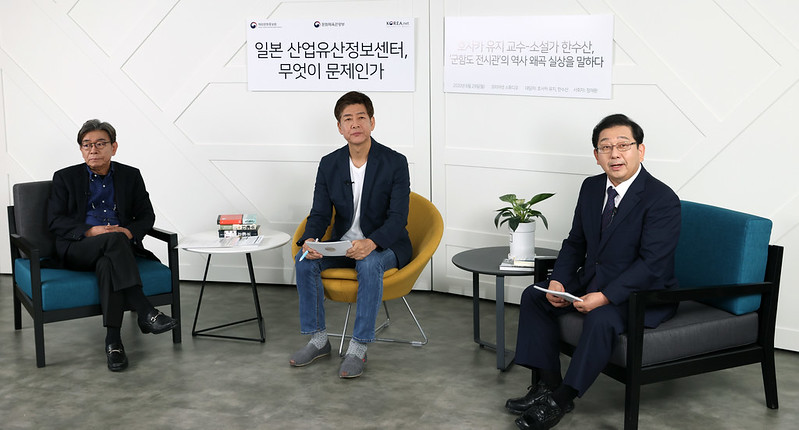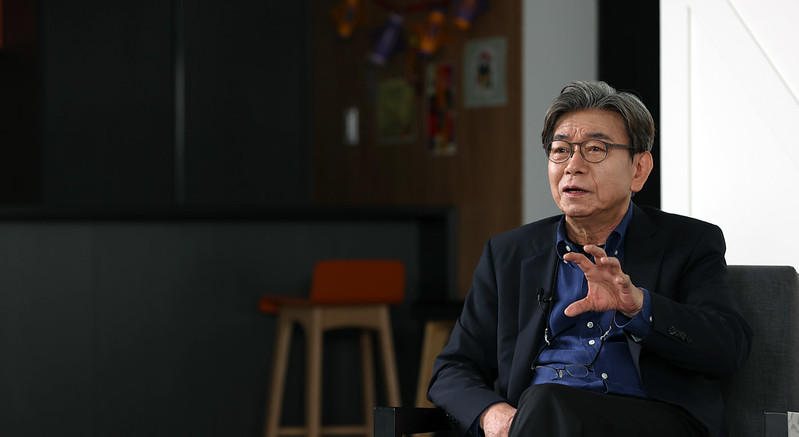
Sejong University professor Yuji Hosaka (right) and author Han Soosan (left), who wrote the novel “Gunhamdo (Battleship Island),” held a talk on June 29 under the theme “What’s Wrong with Japan’s Industrial Heritage Information Centre” at Korea.net’s open studio in Seoul’s Jongno-gu District. TV personality Jung Jaehwan hosted the event.
By Lee Kyoung Mi and Lee Jihae
Photos = Jeon Han
Seoul | June 29, 2020
“The position of Japan’s Abe administration is to hide and glorify Japan’s aggression while claiming no problem with the Japanese military. Japan operates facilities that exhibit distorted history like the Industrial Heritage Information Centre because it’s trying to turn its Self-Defense Forces into a military.” (Yuji Hosaka)
“Claiming that Hashima (Battleship) Island is heritage from the Meiji Industrial Revolution goes beyond history distortion to the level of national deception.” (Han Soosan)
Sejong University professor Yuji Hosaka, a specialist in Korea-Japan relations, and author Han Soosan, who wrote the novel ” Gunhamdo (Battleship Island),” on June 29 held a talk under the theme “What’s Wrong with Japan’s Industrial Heritage Information Centre” at Korea.net’s open studio in Seoul’s Jongno-gu District. They blasted the center’s distortion of history through an exhibition on the island.
TV personality Jung Jaehwan hosted the 90-minute event that began at 5 p.m. The talk’s purpose was to discuss in depth the Japanese government’s distortion of history through the exhibition and responses to this development.
The center was opened on June 15 with the exhibition claiming no discrimination against forced workers on the island.
“Japan promised to present the historical truth at the center, which provides explanations on the 23 sites of the Meiji Industrial Revolution,” Hosaka said. “Korea is enraged because the (center) lacks the explanations pledged by the (Japanese government).”
“(Japan) is using the center politically to gain an advantage in the bilateral issue of a verdict on Korean forced workers.”
On the island, Han said, “This is where Japan’s national crimes during the Japanese colonial period are symbolically and intensively compressed.”
“It has value as an industrial heritage of Japan’s modernization. But only after it clearly presents the historical truth can it qualify as World Cultural Heritage.”
Both the professor and the author also described the dismal reality of forced workers on the island.
“On the surface, workers seemed to receive similar pay without discrimination. But Japan often deducted from their wages dormitory fees, food expenses and forced savings. Or they often just took the workers’ pay,” said Hosaka.
He said about 70% of Korean victims of forced work in coal mines escaped due to brutal conditions, adding, “Once the Koreans escaped, the companies took all of their forced savings.”
Han said, “Under such harsh conditions, the forced workers barely survived on a mixture of leftover beans. They also weren’t properly compensated for their work.”
“If they were sent for work under a national mobilization order, they should’ve at least had their housing, clothes and food provided for. But they were charged for all of these,” he added. “This is a national crime.”

Author Han Soosan, who wrote the historical novel “Gunhamdo (Battleship Island),” on June 29 speaks at Korea.net’s open studio in Seoul’s Jongno-gu District. He said, “Hashima Island is where Japan’s national crimes during the Japanese colonial period are symbolically and intensively compressed.”
Host Jung asked, “Japan thinks that it can deceive the world by hiding history, but can it?”
Hosaka responded by saying, “Neither the world nor Korea will be deceived.”
The professor said a group in Nagasaki, Japan, remembers the Korean victims of forced labor on the island and published the book “If You Listen Closely to Battleship Island” (unofficial translation).”People within Japan haven’t been deceived, so why would the world be?” he added.
Han proposed a cultural approach as the solution to the unending conflict between Korea and Japan. “As the victim country, we must assume responsibilities like continuously bringing back the past by making people sad through novels and angry through movies, and enabling them to blow off steam through songs.”
“If we (keep yelling through culture), Japan will get scared.””We must constantly remember the exact truth,” Hosaka said. “Korea’s task isn’t just to tell the world that Japan is lying but to steadily send facts out to the world.”
“We have to create a more specialized and fun space to convince people around the world,” he added, urging Korea to take a more active role in this.
When asked by an audience member why remembering history is important, Han said, “If we don’t bring back the past and make it alive, our memories will harden like fossils, be forgotten and lose strength in the process.”
“Until when will we repeatedly go through this? The path will be opened if we open our eyes and share deep discussions.”
Eight expats who are Korea.net Honorary Reporters were invited to the event.
The talk can be watched on Korea.net’s official YouTube channel, whose link is below.
www.youtube.com/user/GatewayToKorea
km137426@korea.kr






![[102nd March First Independence Movement Day] American journalist’s Seoul home to be opened to public](https://gangnam.com/file/2021/03/usr_1614255694426-218x150.jpg)
















